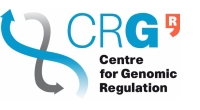Overview
The Bioinformatics Unit provides researchers at CRG-CNAG/PRBB and external organizations with services of consultation, planning NGS and other genomic experiments, NGS data processing, analysis and management, software and database development, bioinformatics training, and access to high-performance computing resources at CRG.
The Unit works in synergy with the Genomics Unit and the Biomolecular Screening & Protein Technologies Unit (BMS-PT) to support users using high-throughput sequencing technologies from an experiment planning to delivery of timely and reliable results.
Services
- Consultation on bioinformatics methods and resources, experimental design, budgeting, sample handling and sequencing, grant proposal development, bioinformatics and statistical data analysis, usage of high-performance computing resources at CRG.
- Bioinformatics training (in person and via internal and external courses).
- Software development: bioinformatics scripts; data processing and analysis pipelines; integrative bioinformatics web applications; customized genome browsers.
- Software evaluation and benchmarking.
- Database development and management.
- Genomics: variant detection; exome and genome re-sequencing; de novo genome assembly; quality assessment of assemblies; analysis of Hi-C, 5C and other high-throughput data.
- Transcriptomics: analysis of RNA-seq, ChIP-Seq, microarrays, OpenArray and other high-throughput data; de novo transcriptome assembly; small RNA expression analysis; functional analysis of differentially expressed genes, including GO term, DNA motif and pathway enrichment analysis.
- Genome/transcriptome functional annotation: ab initio gene prediction, annotation of genes, transcripts, DNA motifs, promoters, and other regulatory elements.
- Metagenomics: identification of microbial and fungi communities from sequences of 16S/18S rRNA and internal transcribed spacer DNA, respectively, and from metagenomic shotgun sequencing data.
- Protein functional annotation, using multiple sequence alignment algorithms, orthology assignment, protein structure comparison and modelling, fold recognition, and phylogenetic analysis.
In addition to services provided for fee, we support fully collaborative grant-funded investigations. This includes preliminary data analysis, planning the grant budget and experiments provided by the CRG Core facility, writing the grant, data analysis and biological inference, custom software development, and co-authored dissemination of the grant results.
For more information and service fees please access the Unit website at http://biocore.crg.eu
For specifics on procedures and deliverables please contact the Unit at BioinformaticsUnit@crg.eu.
To request a service or to propose a collaborative project please contact the Unit head at julia.ponomarenko@crg.eu.

